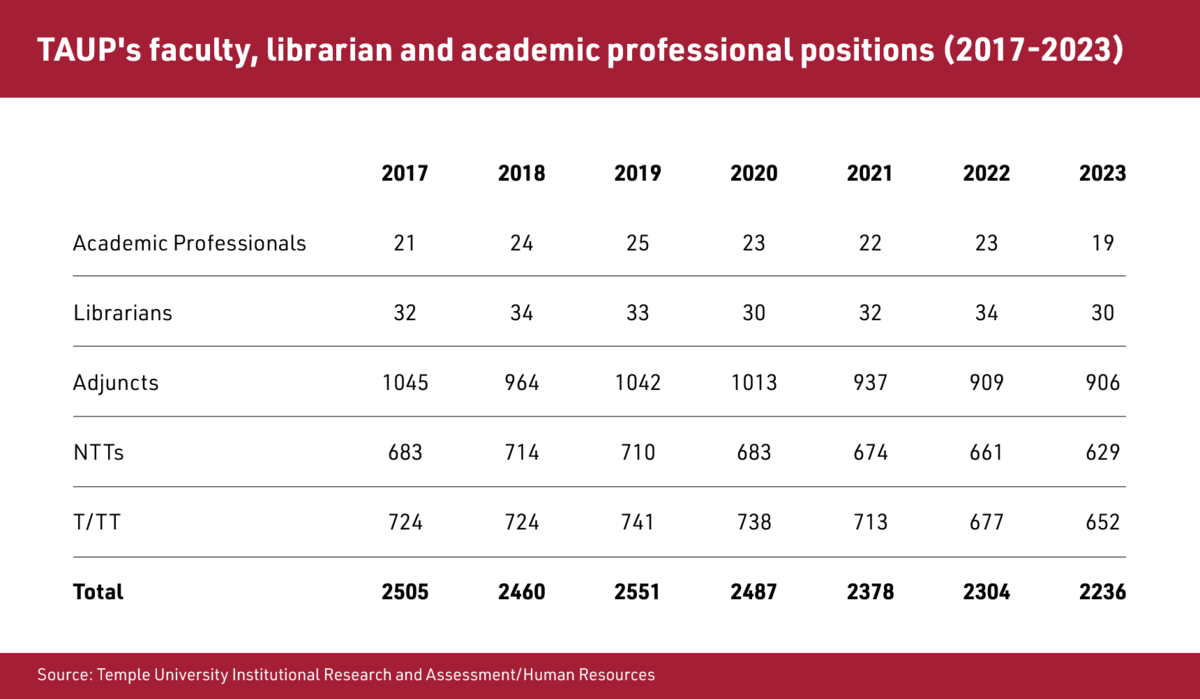Temple presents TAUP with wage and benefits proposal
After reaching an agreement on a package of six noneconomic issues, the university presented TAUP with an economic proposal at the Feb. 26 negotiating session between the two parties. Additional sessions have now been scheduled through early May.

Temple University continues to move forward in its negotiations with the Temple Association of University Professionals (TAUP), the union that represents full- and part-time faculty members, librarians and academic professionals at 13 of Temple’s 17 schools and colleges. At the Feb. 26 bargaining session, following the parties reaching agreement on a package of six noneconomic proposals, the university was able to proceed with presenting a wage and benefits proposal to TAUP.
Highlights from that proposal include the following.
- Retroactive to July 1, 2023, 4% across the board raises for full-time bargaining unit employees, with another 1% merit pool; and then 2% across the board raises with an additional 1% merit pool in each of the next four years.
- An increase to the adjunct per-credit minimum of $1,800 (up from $1,600) retroactive to fall 2023. Adjuncts in the bargaining unit as of fall 2023 and/or spring 2024 who earned above the minimum will receive a one-time payment of $400, less required withholdings and deductions, paid within 30 days of ratification; and the adjunct per-credit minimum will increase by $50 per year beginning fall 2024 semester.
- A faculty member who has been on the nontenure track for 15 consecutive years or more, including time spent by a full-time employee in an administrative faculty appointment, and is not being renewed for reasons that are not related to the faculty member’s conduct or performance, will be entitled to severance pay at the conclusion of their appointment as provided for in Temple policy.
- Librarians and academic professionals will be eligible for paid parental leave under Temple’s policy applicable to nonrepresented Temple staff.
- Librarians and academic professionals will be eligible for short-term disability benefits on the same terms applicable to nonrepresented Temple staff.
- No changes to the employee benefit contribution rate.
The package is conditioned upon ratification by March 31, 2024, and if ratification occurs, this collective bargaining agreement will remain in effect through June 30, 2028.
“The introduction of this package demonstrates the university’s desire to continue moving these negotiations towards a positive resolution,” said Sharon Boyle, vice president for human resources. “We were happy to present this generous offer. Our faculty, librarians and academic professionals are among the only employees who have not yet received a raise this year, and that is a key driver behind this proposal. We would like to get something in place so that we can reward TAUP members for all the work they have done this year.”
Presently, Temple, like many universities across the Northeast, is dealing with enrollment challenges, and the tuition revenue is the primary driver of Temple’s budget.
This year, Temple’s total enrollment is 30,530, but just six years ago, in the fall of 2017, the total was 40,240. This decline of nearly 10,000 students translates to a reduction of approximately $200 million in gross tuition. Despite the enrollment challenges, Temple has worked diligently to be good stewards of its resources and while it has reduced its budget over the last few years, most of these reductions were largely imposed on administrative departments by eliminating vacant positions and nonbargaining salary reductions.
Below is a chart verified by the university’s Data Verification Unit that details how the number of faculty, librarians and academic professionals represented by TAUP has changed from 2017 when Temple’s enrollment was at its peak compared to the present day. As the data shows, Temple has managed to limit the changes in faculty, librarian and academic professional positions to far less when compared to the overall enrollment decline.

“A key thing to remember with Temple is that compensation and benefits make up approximately 65% of our overall operating budget, and we are very lean in other areas. That is because we value our employees, especially those who are in student-facing roles like our faculty members,” said Ken Kaiser, senior vice president and chief operating officer. “One of the things that we made very clear during the COVID-19 pandemic is that the last thing that we ever want to do is pursue layoffs because we know how that negatively impacts families, and that remains true today.”
While significant layoffs have not been pursued at Temple in recent years, each of Temple’s 17 schools and colleges assess individual needs based on enrollment and factors such as, but not limited to, performance, program status and available funding to make decisions in relation to their budgets. Part of this process is making decisions regarding the expiring contracts of nontenure-track (NTT) faculty members.
Often, an NTT faculty member’s contract is renewed for one or multiple years, but given recent enrollment and budgetary challenges, there have been times where an NTT contract may be shortened from the previous contract offered or not renewed. At the end of the 2023 academic year, there were around 20 NTT faculty members of the more than 600 NTT faculty across the schools/colleges represented by the TAUP collective bargaining unit who did not have their contracts renewed. This figure does not include instances where a decision not to renew a contract was mutual (early retirement, other employment, relocation, etc.).
This year, despite the year-to-year enrollment drop from 33,606 students to 30,530, the university anticipates that the number of NTT faculty members across the TAUP-covered schools who will not have contracts renewed will be fewer.
“Our University Budget Office has worked tirelessly to balance the budget, and we are grateful for their efforts,” Kaiser said. “We are eager to continue negotiating with TAUP and we are pleased that we are now beginning to have conversations around economics. As I said before, we are willing to meet as frequently as needed to get this done.”
TAUP’s previous collective bargaining agreement with the university expired on Oct. 15, 2023. The two parties have been negotiating toward a new agreement since Aug. 18, 2023.
TAUP and the university have scheduled additional negotiation dates for the coming months and are now scheduled to meet six times between March 18 and May 1. The university’s goal with negotiations remains the need to provide fair conditions and compensation for faculty, librarians and academic professionals, while also honoring a commitment to keep a Temple education affordable for students.
Visit temple.edu/taup-negotiations to view updates regarding the negotiation process.


